Annotated Bibliography: Case Study of William, Heart Failure, 2806NRS
VerifiedAdded on 2023/04/22
|10
|2515
|178
Annotated Bibliography
AI Summary
This annotated bibliography analyzes a case study of William, a patient with heart failure, as part of a 2806NRS assignment. The student selected three journal articles to provide evidence-based guidance for William's care. The assignment is divided into three parts: an annotated bibliography summarizing the chosen articles, a justification for selecting those specific articles, and recommendations for patient care and clinical practice. The student references key studies on dietary approaches, exercise-based rehabilitation, and psychological interventions for heart failure management. The analysis explores the importance of lifestyle modifications, including diet and exercise, and the role of nursing professionals in supporting patients through motivational interviewing and cognitive behavioral therapy to improve self-management. The student highlights the significance of managing weight, blood pressure, and other risk factors associated with heart disorders and recommends the DASH diet and exercise-based cardiac rehabilitation as effective interventions. The assignment emphasizes the need for comprehensive care, including psychological support, to improve patients' quality of life and prevent recurrence of heart failure symptoms.

Running head: CASE STUDY OF WILLIAM
CASE STUDY OF WILLIAM
Name of the student:
Name of the university:
Author note:
CASE STUDY OF WILLIAM
Name of the student:
Name of the university:
Author note:
Paraphrase This Document
Need a fresh take? Get an instant paraphrase of this document with our AI Paraphraser
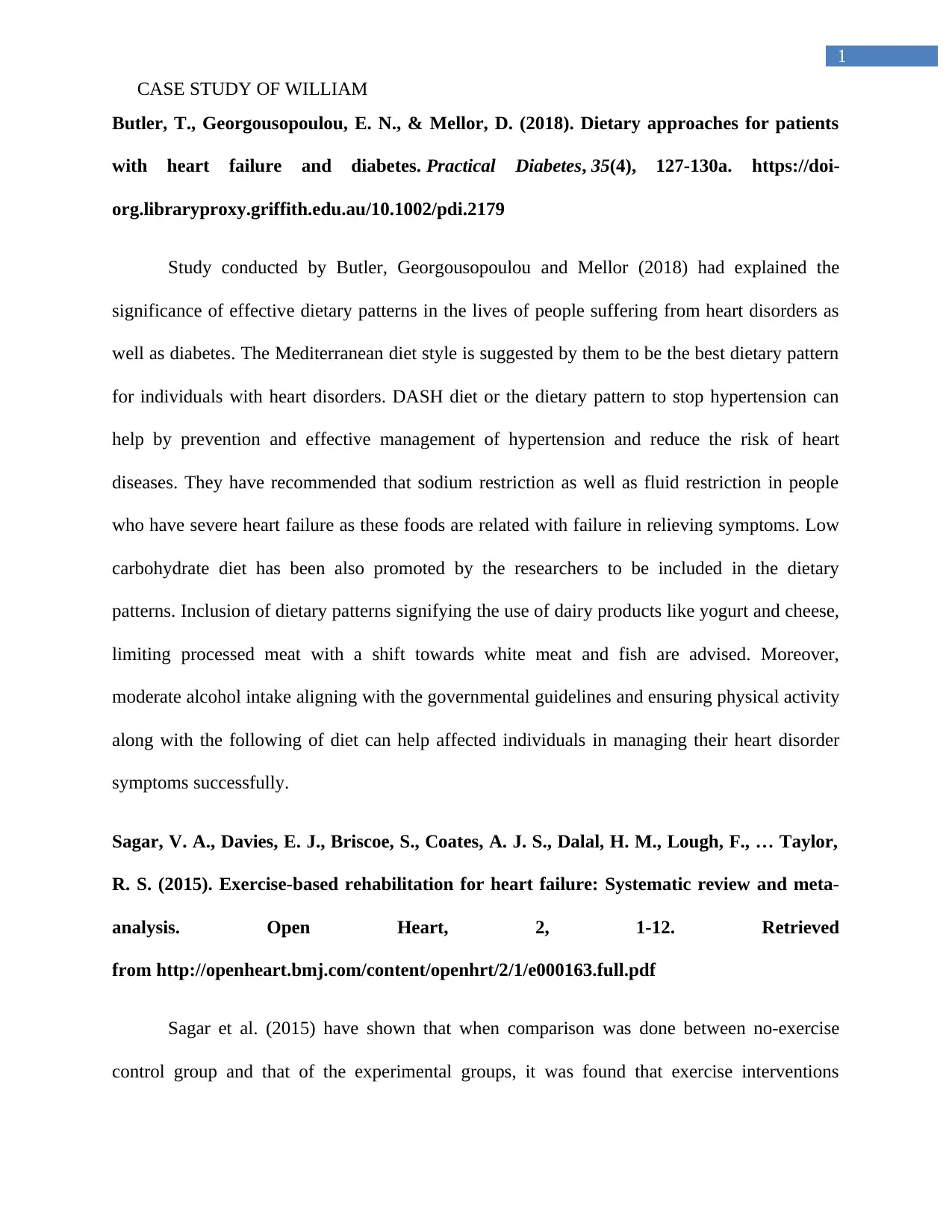
1
CASE STUDY OF WILLIAM
Butler, T., Georgousopoulou, E. N., & Mellor, D. (2018). Dietary approaches for patients
with heart failure and diabetes. Practical Diabetes, 35(4), 127-130a. https://doi-
org.libraryproxy.griffith.edu.au/10.1002/pdi.2179
Study conducted by Butler, Georgousopoulou and Mellor (2018) had explained the
significance of effective dietary patterns in the lives of people suffering from heart disorders as
well as diabetes. The Mediterranean diet style is suggested by them to be the best dietary pattern
for individuals with heart disorders. DASH diet or the dietary pattern to stop hypertension can
help by prevention and effective management of hypertension and reduce the risk of heart
diseases. They have recommended that sodium restriction as well as fluid restriction in people
who have severe heart failure as these foods are related with failure in relieving symptoms. Low
carbohydrate diet has been also promoted by the researchers to be included in the dietary
patterns. Inclusion of dietary patterns signifying the use of dairy products like yogurt and cheese,
limiting processed meat with a shift towards white meat and fish are advised. Moreover,
moderate alcohol intake aligning with the governmental guidelines and ensuring physical activity
along with the following of diet can help affected individuals in managing their heart disorder
symptoms successfully.
Sagar, V. A., Davies, E. J., Briscoe, S., Coates, A. J. S., Dalal, H. M., Lough, F., … Taylor,
R. S. (2015). Exercise-based rehabilitation for heart failure: Systematic review and meta-
analysis. Open Heart, 2, 1-12. Retrieved
from http://openheart.bmj.com/content/openhrt/2/1/e000163.full.pdf
Sagar et al. (2015) have shown that when comparison was done between no-exercise
control group and that of the experimental groups, it was found that exercise interventions
CASE STUDY OF WILLIAM
Butler, T., Georgousopoulou, E. N., & Mellor, D. (2018). Dietary approaches for patients
with heart failure and diabetes. Practical Diabetes, 35(4), 127-130a. https://doi-
org.libraryproxy.griffith.edu.au/10.1002/pdi.2179
Study conducted by Butler, Georgousopoulou and Mellor (2018) had explained the
significance of effective dietary patterns in the lives of people suffering from heart disorders as
well as diabetes. The Mediterranean diet style is suggested by them to be the best dietary pattern
for individuals with heart disorders. DASH diet or the dietary pattern to stop hypertension can
help by prevention and effective management of hypertension and reduce the risk of heart
diseases. They have recommended that sodium restriction as well as fluid restriction in people
who have severe heart failure as these foods are related with failure in relieving symptoms. Low
carbohydrate diet has been also promoted by the researchers to be included in the dietary
patterns. Inclusion of dietary patterns signifying the use of dairy products like yogurt and cheese,
limiting processed meat with a shift towards white meat and fish are advised. Moreover,
moderate alcohol intake aligning with the governmental guidelines and ensuring physical activity
along with the following of diet can help affected individuals in managing their heart disorder
symptoms successfully.
Sagar, V. A., Davies, E. J., Briscoe, S., Coates, A. J. S., Dalal, H. M., Lough, F., … Taylor,
R. S. (2015). Exercise-based rehabilitation for heart failure: Systematic review and meta-
analysis. Open Heart, 2, 1-12. Retrieved
from http://openheart.bmj.com/content/openhrt/2/1/e000163.full.pdf
Sagar et al. (2015) have shown that when comparison was done between no-exercise
control group and that of the experimental groups, it was found that exercise interventions
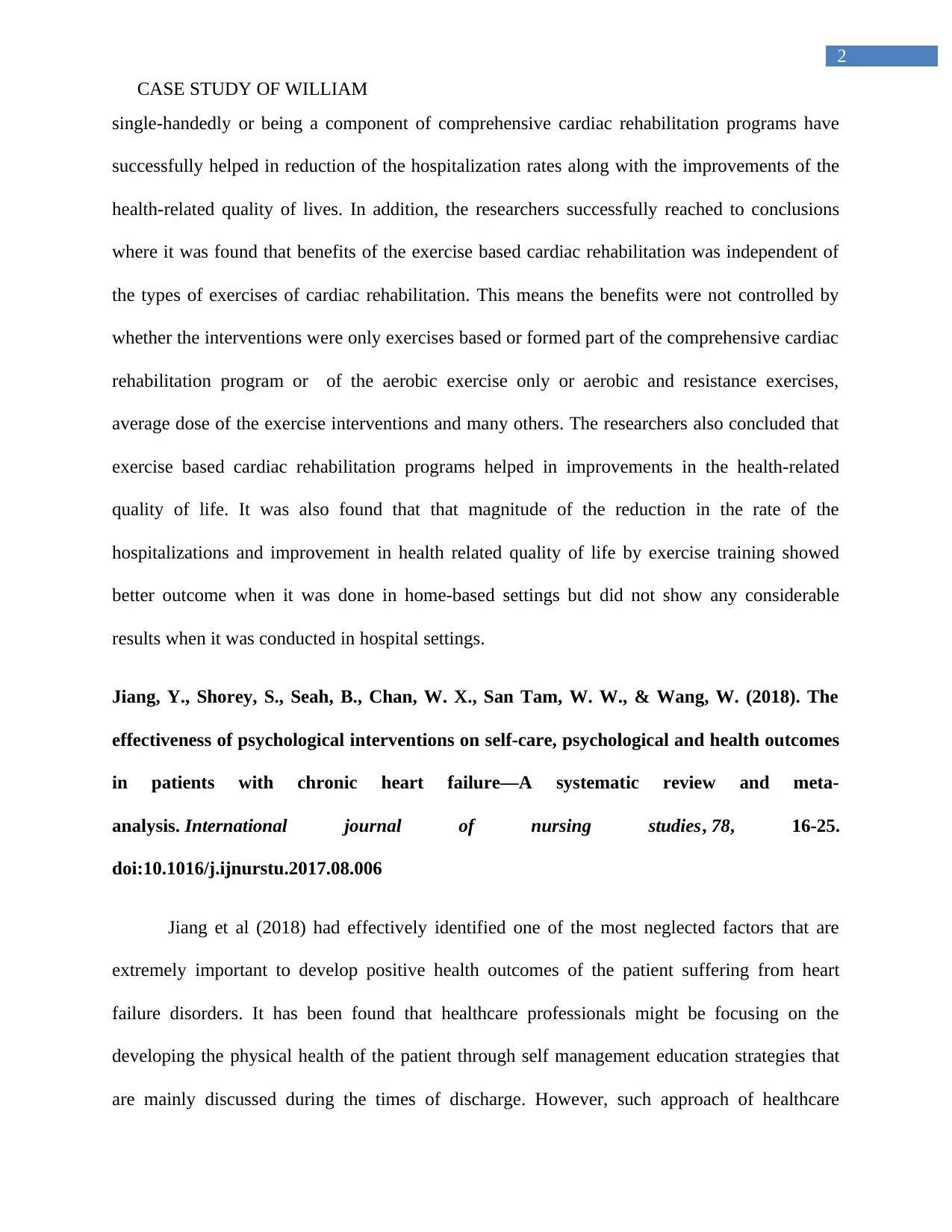
2
CASE STUDY OF WILLIAM
single-handedly or being a component of comprehensive cardiac rehabilitation programs have
successfully helped in reduction of the hospitalization rates along with the improvements of the
health-related quality of lives. In addition, the researchers successfully reached to conclusions
where it was found that benefits of the exercise based cardiac rehabilitation was independent of
the types of exercises of cardiac rehabilitation. This means the benefits were not controlled by
whether the interventions were only exercises based or formed part of the comprehensive cardiac
rehabilitation program or of the aerobic exercise only or aerobic and resistance exercises,
average dose of the exercise interventions and many others. The researchers also concluded that
exercise based cardiac rehabilitation programs helped in improvements in the health-related
quality of life. It was also found that that magnitude of the reduction in the rate of the
hospitalizations and improvement in health related quality of life by exercise training showed
better outcome when it was done in home-based settings but did not show any considerable
results when it was conducted in hospital settings.
Jiang, Y., Shorey, S., Seah, B., Chan, W. X., San Tam, W. W., & Wang, W. (2018). The
effectiveness of psychological interventions on self-care, psychological and health outcomes
in patients with chronic heart failure—A systematic review and meta-
analysis. International journal of nursing studies, 78, 16-25.
doi:10.1016/j.ijnurstu.2017.08.006
Jiang et al (2018) had effectively identified one of the most neglected factors that are
extremely important to develop positive health outcomes of the patient suffering from heart
failure disorders. It has been found that healthcare professionals might be focusing on the
developing the physical health of the patient through self management education strategies that
are mainly discussed during the times of discharge. However, such approach of healthcare
CASE STUDY OF WILLIAM
single-handedly or being a component of comprehensive cardiac rehabilitation programs have
successfully helped in reduction of the hospitalization rates along with the improvements of the
health-related quality of lives. In addition, the researchers successfully reached to conclusions
where it was found that benefits of the exercise based cardiac rehabilitation was independent of
the types of exercises of cardiac rehabilitation. This means the benefits were not controlled by
whether the interventions were only exercises based or formed part of the comprehensive cardiac
rehabilitation program or of the aerobic exercise only or aerobic and resistance exercises,
average dose of the exercise interventions and many others. The researchers also concluded that
exercise based cardiac rehabilitation programs helped in improvements in the health-related
quality of life. It was also found that that magnitude of the reduction in the rate of the
hospitalizations and improvement in health related quality of life by exercise training showed
better outcome when it was done in home-based settings but did not show any considerable
results when it was conducted in hospital settings.
Jiang, Y., Shorey, S., Seah, B., Chan, W. X., San Tam, W. W., & Wang, W. (2018). The
effectiveness of psychological interventions on self-care, psychological and health outcomes
in patients with chronic heart failure—A systematic review and meta-
analysis. International journal of nursing studies, 78, 16-25.
doi:10.1016/j.ijnurstu.2017.08.006
Jiang et al (2018) had effectively identified one of the most neglected factors that are
extremely important to develop positive health outcomes of the patient suffering from heart
failure disorders. It has been found that healthcare professionals might be focusing on the
developing the physical health of the patient through self management education strategies that
are mainly discussed during the times of discharge. However, such approach of healthcare
⊘ This is a preview!⊘
Do you want full access?
Subscribe today to unlock all pages.

Trusted by 1+ million students worldwide
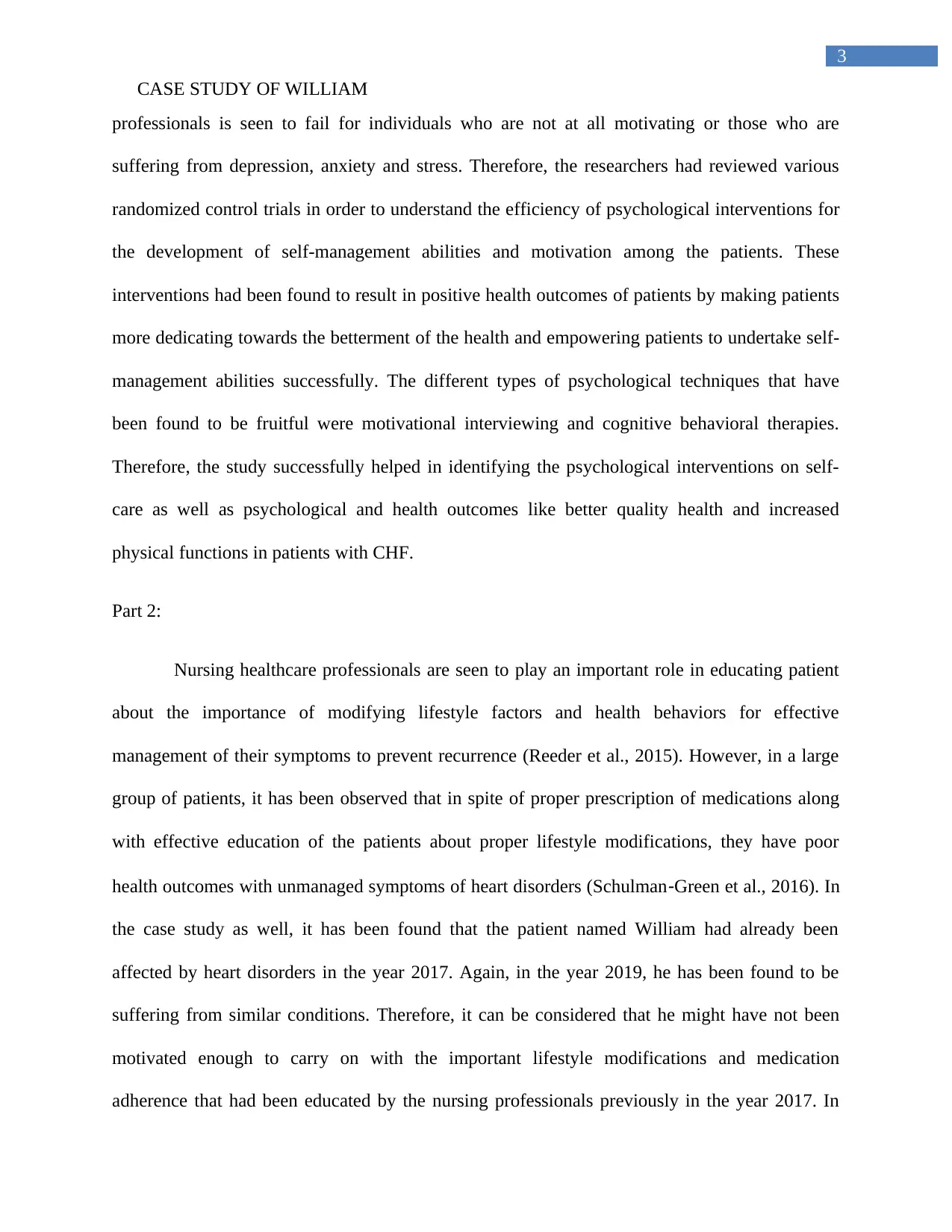
3
CASE STUDY OF WILLIAM
professionals is seen to fail for individuals who are not at all motivating or those who are
suffering from depression, anxiety and stress. Therefore, the researchers had reviewed various
randomized control trials in order to understand the efficiency of psychological interventions for
the development of self-management abilities and motivation among the patients. These
interventions had been found to result in positive health outcomes of patients by making patients
more dedicating towards the betterment of the health and empowering patients to undertake self-
management abilities successfully. The different types of psychological techniques that have
been found to be fruitful were motivational interviewing and cognitive behavioral therapies.
Therefore, the study successfully helped in identifying the psychological interventions on self-
care as well as psychological and health outcomes like better quality health and increased
physical functions in patients with CHF.
Part 2:
Nursing healthcare professionals are seen to play an important role in educating patient
about the importance of modifying lifestyle factors and health behaviors for effective
management of their symptoms to prevent recurrence (Reeder et al., 2015). However, in a large
group of patients, it has been observed that in spite of proper prescription of medications along
with effective education of the patients about proper lifestyle modifications, they have poor
health outcomes with unmanaged symptoms of heart disorders (Schulman‐Green et al., 2016). In
the case study as well, it has been found that the patient named William had already been
affected by heart disorders in the year 2017. Again, in the year 2019, he has been found to be
suffering from similar conditions. Therefore, it can be considered that he might have not been
motivated enough to carry on with the important lifestyle modifications and medication
adherence that had been educated by the nursing professionals previously in the year 2017. In
CASE STUDY OF WILLIAM
professionals is seen to fail for individuals who are not at all motivating or those who are
suffering from depression, anxiety and stress. Therefore, the researchers had reviewed various
randomized control trials in order to understand the efficiency of psychological interventions for
the development of self-management abilities and motivation among the patients. These
interventions had been found to result in positive health outcomes of patients by making patients
more dedicating towards the betterment of the health and empowering patients to undertake self-
management abilities successfully. The different types of psychological techniques that have
been found to be fruitful were motivational interviewing and cognitive behavioral therapies.
Therefore, the study successfully helped in identifying the psychological interventions on self-
care as well as psychological and health outcomes like better quality health and increased
physical functions in patients with CHF.
Part 2:
Nursing healthcare professionals are seen to play an important role in educating patient
about the importance of modifying lifestyle factors and health behaviors for effective
management of their symptoms to prevent recurrence (Reeder et al., 2015). However, in a large
group of patients, it has been observed that in spite of proper prescription of medications along
with effective education of the patients about proper lifestyle modifications, they have poor
health outcomes with unmanaged symptoms of heart disorders (Schulman‐Green et al., 2016). In
the case study as well, it has been found that the patient named William had already been
affected by heart disorders in the year 2017. Again, in the year 2019, he has been found to be
suffering from similar conditions. Therefore, it can be considered that he might have not been
motivated enough to carry on with the important lifestyle modifications and medication
adherence that had been educated by the nursing professionals previously in the year 2017. In
Paraphrase This Document
Need a fresh take? Get an instant paraphrase of this document with our AI Paraphraser
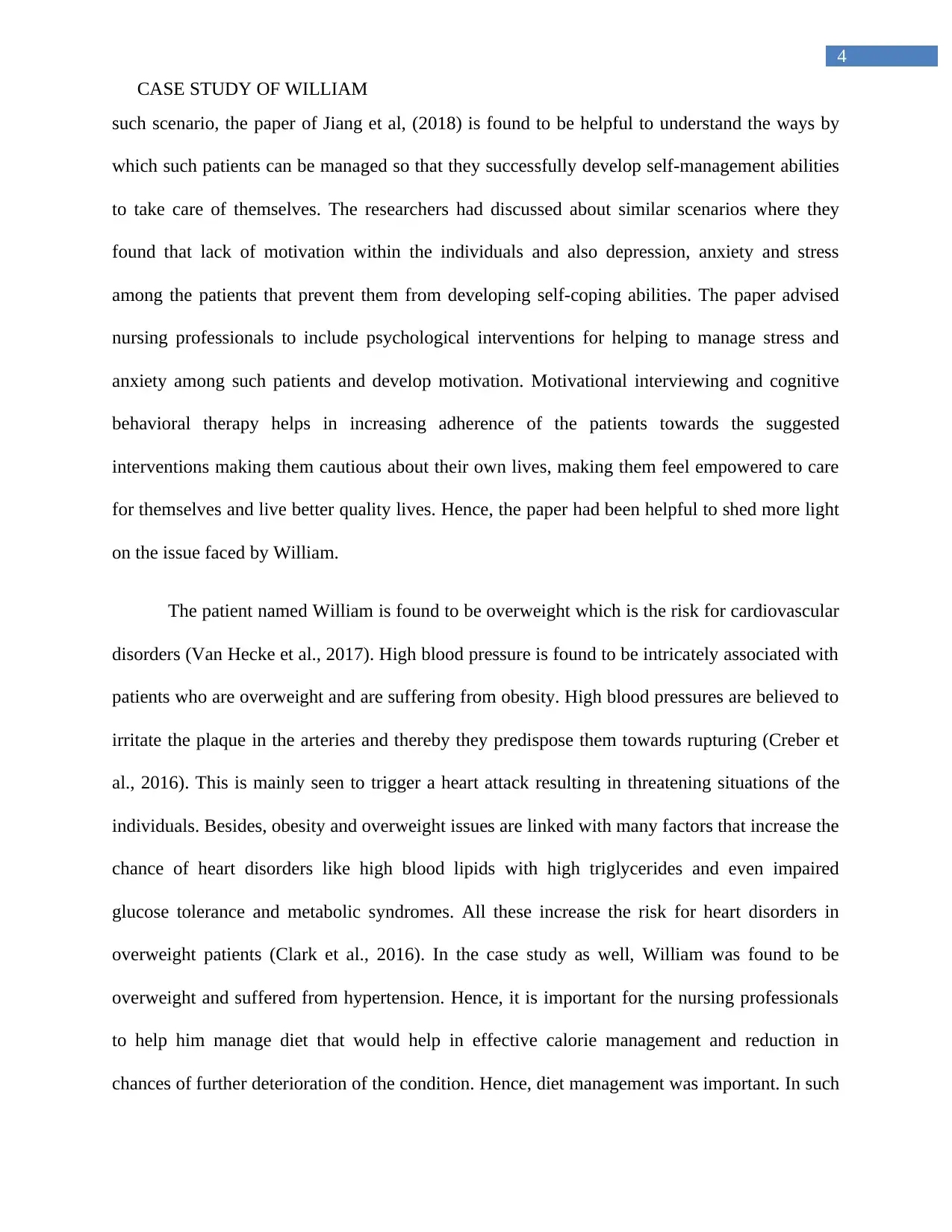
4
CASE STUDY OF WILLIAM
such scenario, the paper of Jiang et al, (2018) is found to be helpful to understand the ways by
which such patients can be managed so that they successfully develop self-management abilities
to take care of themselves. The researchers had discussed about similar scenarios where they
found that lack of motivation within the individuals and also depression, anxiety and stress
among the patients that prevent them from developing self-coping abilities. The paper advised
nursing professionals to include psychological interventions for helping to manage stress and
anxiety among such patients and develop motivation. Motivational interviewing and cognitive
behavioral therapy helps in increasing adherence of the patients towards the suggested
interventions making them cautious about their own lives, making them feel empowered to care
for themselves and live better quality lives. Hence, the paper had been helpful to shed more light
on the issue faced by William.
The patient named William is found to be overweight which is the risk for cardiovascular
disorders (Van Hecke et al., 2017). High blood pressure is found to be intricately associated with
patients who are overweight and are suffering from obesity. High blood pressures are believed to
irritate the plaque in the arteries and thereby they predispose them towards rupturing (Creber et
al., 2016). This is mainly seen to trigger a heart attack resulting in threatening situations of the
individuals. Besides, obesity and overweight issues are linked with many factors that increase the
chance of heart disorders like high blood lipids with high triglycerides and even impaired
glucose tolerance and metabolic syndromes. All these increase the risk for heart disorders in
overweight patients (Clark et al., 2016). In the case study as well, William was found to be
overweight and suffered from hypertension. Hence, it is important for the nursing professionals
to help him manage diet that would help in effective calorie management and reduction in
chances of further deterioration of the condition. Hence, diet management was important. In such
CASE STUDY OF WILLIAM
such scenario, the paper of Jiang et al, (2018) is found to be helpful to understand the ways by
which such patients can be managed so that they successfully develop self-management abilities
to take care of themselves. The researchers had discussed about similar scenarios where they
found that lack of motivation within the individuals and also depression, anxiety and stress
among the patients that prevent them from developing self-coping abilities. The paper advised
nursing professionals to include psychological interventions for helping to manage stress and
anxiety among such patients and develop motivation. Motivational interviewing and cognitive
behavioral therapy helps in increasing adherence of the patients towards the suggested
interventions making them cautious about their own lives, making them feel empowered to care
for themselves and live better quality lives. Hence, the paper had been helpful to shed more light
on the issue faced by William.
The patient named William is found to be overweight which is the risk for cardiovascular
disorders (Van Hecke et al., 2017). High blood pressure is found to be intricately associated with
patients who are overweight and are suffering from obesity. High blood pressures are believed to
irritate the plaque in the arteries and thereby they predispose them towards rupturing (Creber et
al., 2016). This is mainly seen to trigger a heart attack resulting in threatening situations of the
individuals. Besides, obesity and overweight issues are linked with many factors that increase the
chance of heart disorders like high blood lipids with high triglycerides and even impaired
glucose tolerance and metabolic syndromes. All these increase the risk for heart disorders in
overweight patients (Clark et al., 2016). In the case study as well, William was found to be
overweight and suffered from hypertension. Hence, it is important for the nursing professionals
to help him manage diet that would help in effective calorie management and reduction in
chances of further deterioration of the condition. Hence, diet management was important. In such
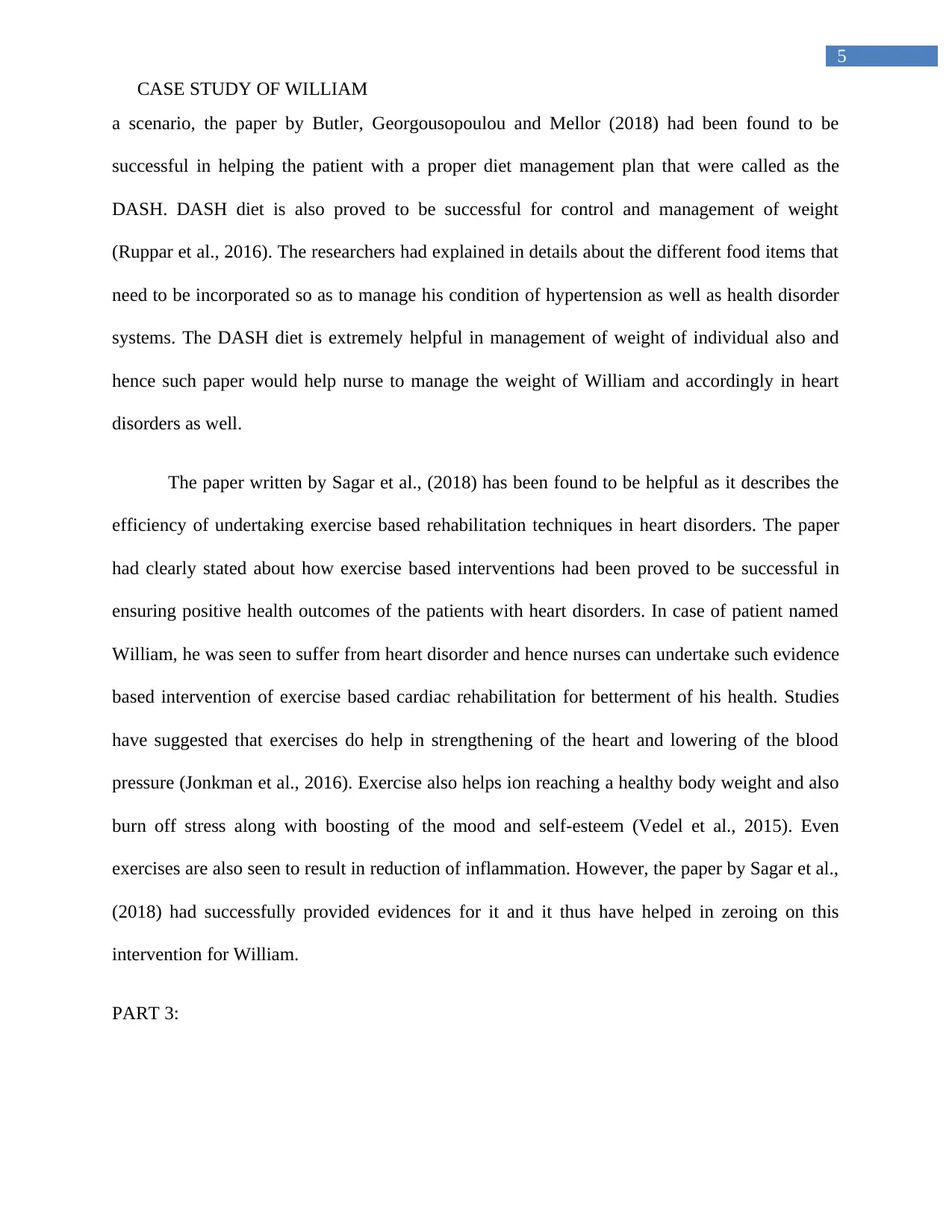
5
CASE STUDY OF WILLIAM
a scenario, the paper by Butler, Georgousopoulou and Mellor (2018) had been found to be
successful in helping the patient with a proper diet management plan that were called as the
DASH. DASH diet is also proved to be successful for control and management of weight
(Ruppar et al., 2016). The researchers had explained in details about the different food items that
need to be incorporated so as to manage his condition of hypertension as well as health disorder
systems. The DASH diet is extremely helpful in management of weight of individual also and
hence such paper would help nurse to manage the weight of William and accordingly in heart
disorders as well.
The paper written by Sagar et al., (2018) has been found to be helpful as it describes the
efficiency of undertaking exercise based rehabilitation techniques in heart disorders. The paper
had clearly stated about how exercise based interventions had been proved to be successful in
ensuring positive health outcomes of the patients with heart disorders. In case of patient named
William, he was seen to suffer from heart disorder and hence nurses can undertake such evidence
based intervention of exercise based cardiac rehabilitation for betterment of his health. Studies
have suggested that exercises do help in strengthening of the heart and lowering of the blood
pressure (Jonkman et al., 2016). Exercise also helps ion reaching a healthy body weight and also
burn off stress along with boosting of the mood and self-esteem (Vedel et al., 2015). Even
exercises are also seen to result in reduction of inflammation. However, the paper by Sagar et al.,
(2018) had successfully provided evidences for it and it thus have helped in zeroing on this
intervention for William.
PART 3:
CASE STUDY OF WILLIAM
a scenario, the paper by Butler, Georgousopoulou and Mellor (2018) had been found to be
successful in helping the patient with a proper diet management plan that were called as the
DASH. DASH diet is also proved to be successful for control and management of weight
(Ruppar et al., 2016). The researchers had explained in details about the different food items that
need to be incorporated so as to manage his condition of hypertension as well as health disorder
systems. The DASH diet is extremely helpful in management of weight of individual also and
hence such paper would help nurse to manage the weight of William and accordingly in heart
disorders as well.
The paper written by Sagar et al., (2018) has been found to be helpful as it describes the
efficiency of undertaking exercise based rehabilitation techniques in heart disorders. The paper
had clearly stated about how exercise based interventions had been proved to be successful in
ensuring positive health outcomes of the patients with heart disorders. In case of patient named
William, he was seen to suffer from heart disorder and hence nurses can undertake such evidence
based intervention of exercise based cardiac rehabilitation for betterment of his health. Studies
have suggested that exercises do help in strengthening of the heart and lowering of the blood
pressure (Jonkman et al., 2016). Exercise also helps ion reaching a healthy body weight and also
burn off stress along with boosting of the mood and self-esteem (Vedel et al., 2015). Even
exercises are also seen to result in reduction of inflammation. However, the paper by Sagar et al.,
(2018) had successfully provided evidences for it and it thus have helped in zeroing on this
intervention for William.
PART 3:
⊘ This is a preview!⊘
Do you want full access?
Subscribe today to unlock all pages.

Trusted by 1+ million students worldwide
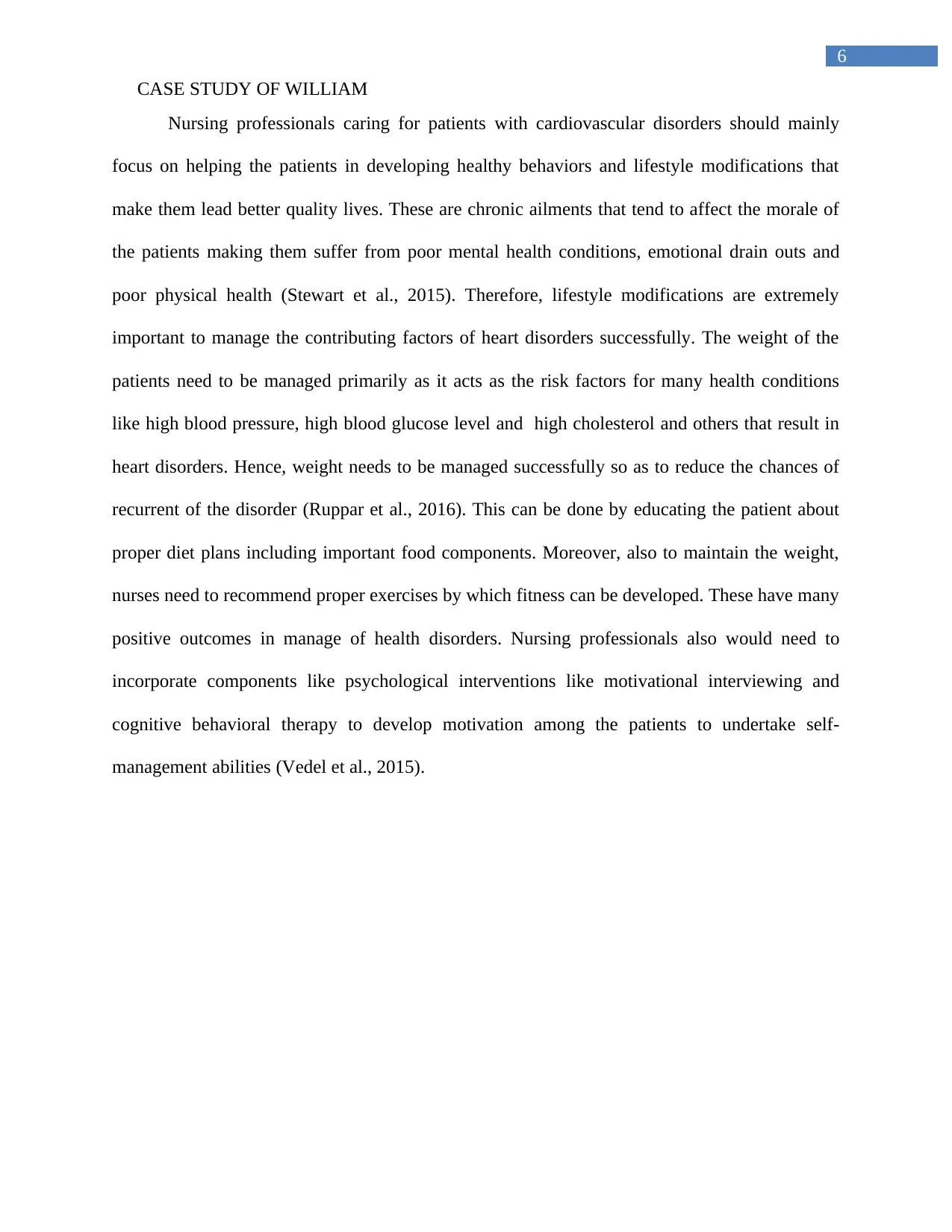
6
CASE STUDY OF WILLIAM
Nursing professionals caring for patients with cardiovascular disorders should mainly
focus on helping the patients in developing healthy behaviors and lifestyle modifications that
make them lead better quality lives. These are chronic ailments that tend to affect the morale of
the patients making them suffer from poor mental health conditions, emotional drain outs and
poor physical health (Stewart et al., 2015). Therefore, lifestyle modifications are extremely
important to manage the contributing factors of heart disorders successfully. The weight of the
patients need to be managed primarily as it acts as the risk factors for many health conditions
like high blood pressure, high blood glucose level and high cholesterol and others that result in
heart disorders. Hence, weight needs to be managed successfully so as to reduce the chances of
recurrent of the disorder (Ruppar et al., 2016). This can be done by educating the patient about
proper diet plans including important food components. Moreover, also to maintain the weight,
nurses need to recommend proper exercises by which fitness can be developed. These have many
positive outcomes in manage of health disorders. Nursing professionals also would need to
incorporate components like psychological interventions like motivational interviewing and
cognitive behavioral therapy to develop motivation among the patients to undertake self-
management abilities (Vedel et al., 2015).
CASE STUDY OF WILLIAM
Nursing professionals caring for patients with cardiovascular disorders should mainly
focus on helping the patients in developing healthy behaviors and lifestyle modifications that
make them lead better quality lives. These are chronic ailments that tend to affect the morale of
the patients making them suffer from poor mental health conditions, emotional drain outs and
poor physical health (Stewart et al., 2015). Therefore, lifestyle modifications are extremely
important to manage the contributing factors of heart disorders successfully. The weight of the
patients need to be managed primarily as it acts as the risk factors for many health conditions
like high blood pressure, high blood glucose level and high cholesterol and others that result in
heart disorders. Hence, weight needs to be managed successfully so as to reduce the chances of
recurrent of the disorder (Ruppar et al., 2016). This can be done by educating the patient about
proper diet plans including important food components. Moreover, also to maintain the weight,
nurses need to recommend proper exercises by which fitness can be developed. These have many
positive outcomes in manage of health disorders. Nursing professionals also would need to
incorporate components like psychological interventions like motivational interviewing and
cognitive behavioral therapy to develop motivation among the patients to undertake self-
management abilities (Vedel et al., 2015).
Paraphrase This Document
Need a fresh take? Get an instant paraphrase of this document with our AI Paraphraser
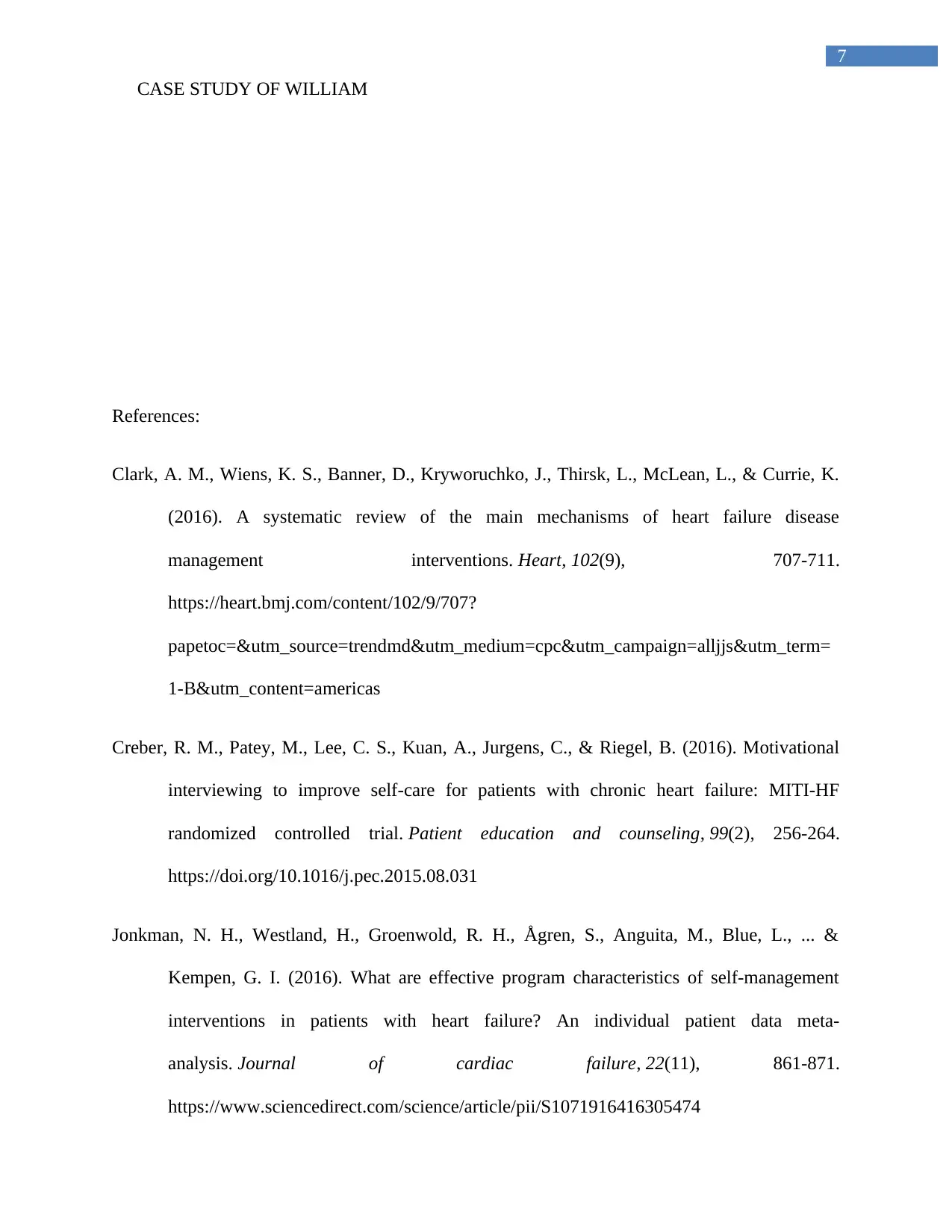
7
CASE STUDY OF WILLIAM
References:
Clark, A. M., Wiens, K. S., Banner, D., Kryworuchko, J., Thirsk, L., McLean, L., & Currie, K.
(2016). A systematic review of the main mechanisms of heart failure disease
management interventions. Heart, 102(9), 707-711.
https://heart.bmj.com/content/102/9/707?
papetoc=&utm_source=trendmd&utm_medium=cpc&utm_campaign=alljjs&utm_term=
1-B&utm_content=americas
Creber, R. M., Patey, M., Lee, C. S., Kuan, A., Jurgens, C., & Riegel, B. (2016). Motivational
interviewing to improve self-care for patients with chronic heart failure: MITI-HF
randomized controlled trial. Patient education and counseling, 99(2), 256-264.
https://doi.org/10.1016/j.pec.2015.08.031
Jonkman, N. H., Westland, H., Groenwold, R. H., Ågren, S., Anguita, M., Blue, L., ... &
Kempen, G. I. (2016). What are effective program characteristics of self-management
interventions in patients with heart failure? An individual patient data meta-
analysis. Journal of cardiac failure, 22(11), 861-871.
https://www.sciencedirect.com/science/article/pii/S1071916416305474
CASE STUDY OF WILLIAM
References:
Clark, A. M., Wiens, K. S., Banner, D., Kryworuchko, J., Thirsk, L., McLean, L., & Currie, K.
(2016). A systematic review of the main mechanisms of heart failure disease
management interventions. Heart, 102(9), 707-711.
https://heart.bmj.com/content/102/9/707?
papetoc=&utm_source=trendmd&utm_medium=cpc&utm_campaign=alljjs&utm_term=
1-B&utm_content=americas
Creber, R. M., Patey, M., Lee, C. S., Kuan, A., Jurgens, C., & Riegel, B. (2016). Motivational
interviewing to improve self-care for patients with chronic heart failure: MITI-HF
randomized controlled trial. Patient education and counseling, 99(2), 256-264.
https://doi.org/10.1016/j.pec.2015.08.031
Jonkman, N. H., Westland, H., Groenwold, R. H., Ågren, S., Anguita, M., Blue, L., ... &
Kempen, G. I. (2016). What are effective program characteristics of self-management
interventions in patients with heart failure? An individual patient data meta-
analysis. Journal of cardiac failure, 22(11), 861-871.
https://www.sciencedirect.com/science/article/pii/S1071916416305474
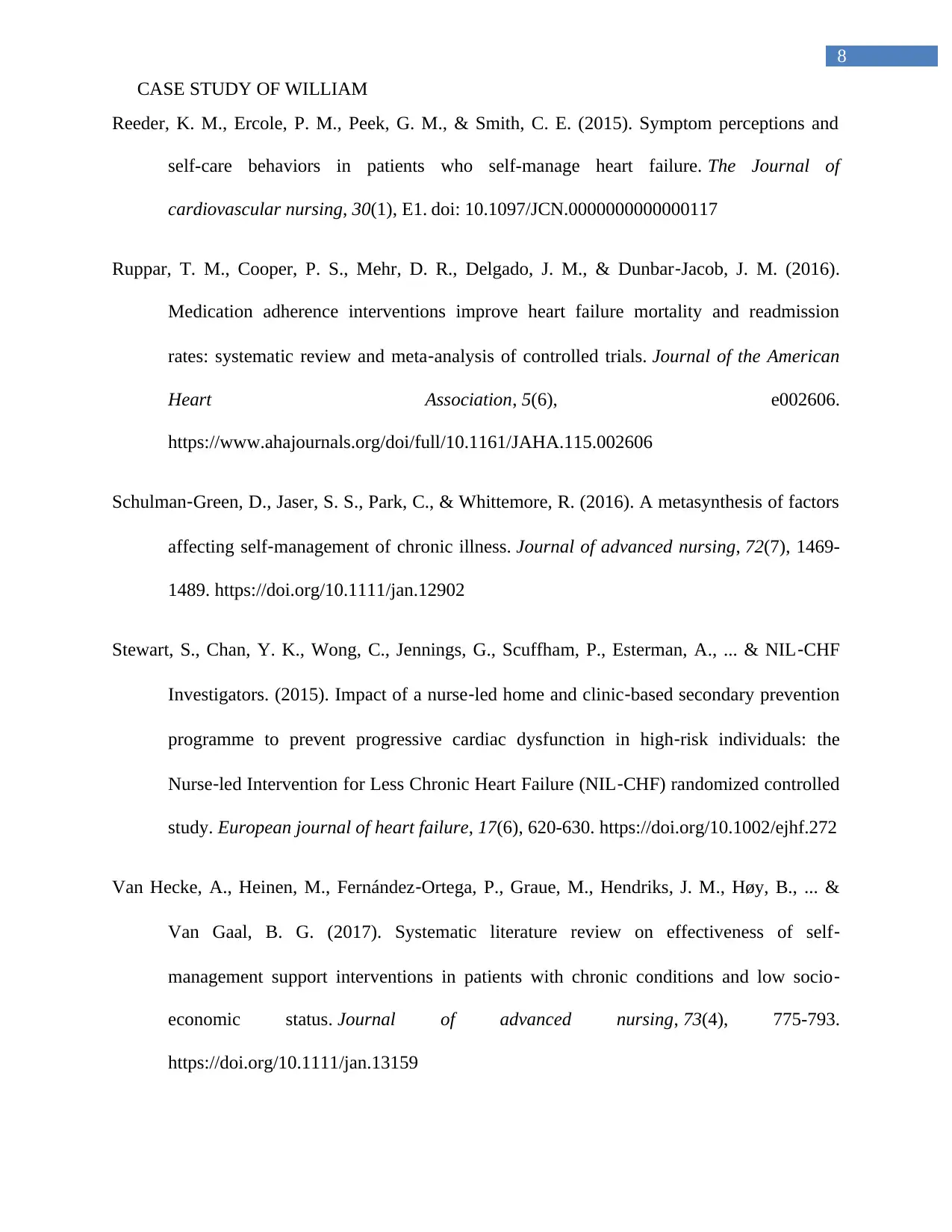
8
CASE STUDY OF WILLIAM
Reeder, K. M., Ercole, P. M., Peek, G. M., & Smith, C. E. (2015). Symptom perceptions and
self-care behaviors in patients who self-manage heart failure. The Journal of
cardiovascular nursing, 30(1), E1. doi: 10.1097/JCN.0000000000000117
Ruppar, T. M., Cooper, P. S., Mehr, D. R., Delgado, J. M., & Dunbar‐Jacob, J. M. (2016).
Medication adherence interventions improve heart failure mortality and readmission
rates: systematic review and meta‐analysis of controlled trials. Journal of the American
Heart Association, 5(6), e002606.
https://www.ahajournals.org/doi/full/10.1161/JAHA.115.002606
Schulman‐Green, D., Jaser, S. S., Park, C., & Whittemore, R. (2016). A metasynthesis of factors
affecting self‐management of chronic illness. Journal of advanced nursing, 72(7), 1469-
1489. https://doi.org/10.1111/jan.12902
Stewart, S., Chan, Y. K., Wong, C., Jennings, G., Scuffham, P., Esterman, A., ... & NIL‐CHF
Investigators. (2015). Impact of a nurse‐led home and clinic‐based secondary prevention
programme to prevent progressive cardiac dysfunction in high‐risk individuals: the
Nurse‐led Intervention for Less Chronic Heart Failure (NIL‐CHF) randomized controlled
study. European journal of heart failure, 17(6), 620-630. https://doi.org/10.1002/ejhf.272
Van Hecke, A., Heinen, M., Fernández‐Ortega, P., Graue, M., Hendriks, J. M., Høy, B., ... &
Van Gaal, B. G. (2017). Systematic literature review on effectiveness of self‐
management support interventions in patients with chronic conditions and low socio‐
economic status. Journal of advanced nursing, 73(4), 775-793.
https://doi.org/10.1111/jan.13159
CASE STUDY OF WILLIAM
Reeder, K. M., Ercole, P. M., Peek, G. M., & Smith, C. E. (2015). Symptom perceptions and
self-care behaviors in patients who self-manage heart failure. The Journal of
cardiovascular nursing, 30(1), E1. doi: 10.1097/JCN.0000000000000117
Ruppar, T. M., Cooper, P. S., Mehr, D. R., Delgado, J. M., & Dunbar‐Jacob, J. M. (2016).
Medication adherence interventions improve heart failure mortality and readmission
rates: systematic review and meta‐analysis of controlled trials. Journal of the American
Heart Association, 5(6), e002606.
https://www.ahajournals.org/doi/full/10.1161/JAHA.115.002606
Schulman‐Green, D., Jaser, S. S., Park, C., & Whittemore, R. (2016). A metasynthesis of factors
affecting self‐management of chronic illness. Journal of advanced nursing, 72(7), 1469-
1489. https://doi.org/10.1111/jan.12902
Stewart, S., Chan, Y. K., Wong, C., Jennings, G., Scuffham, P., Esterman, A., ... & NIL‐CHF
Investigators. (2015). Impact of a nurse‐led home and clinic‐based secondary prevention
programme to prevent progressive cardiac dysfunction in high‐risk individuals: the
Nurse‐led Intervention for Less Chronic Heart Failure (NIL‐CHF) randomized controlled
study. European journal of heart failure, 17(6), 620-630. https://doi.org/10.1002/ejhf.272
Van Hecke, A., Heinen, M., Fernández‐Ortega, P., Graue, M., Hendriks, J. M., Høy, B., ... &
Van Gaal, B. G. (2017). Systematic literature review on effectiveness of self‐
management support interventions in patients with chronic conditions and low socio‐
economic status. Journal of advanced nursing, 73(4), 775-793.
https://doi.org/10.1111/jan.13159
⊘ This is a preview!⊘
Do you want full access?
Subscribe today to unlock all pages.

Trusted by 1+ million students worldwide

9
CASE STUDY OF WILLIAM
Vedel, I., & Khanassov, V. (2015). Transitional care for patients with congestive heart failure: a
systematic review and meta-analysis. The Annals of Family Medicine, 13(6), 562-571.
http://www.annfammed.org/content/13/6/562.short
CASE STUDY OF WILLIAM
Vedel, I., & Khanassov, V. (2015). Transitional care for patients with congestive heart failure: a
systematic review and meta-analysis. The Annals of Family Medicine, 13(6), 562-571.
http://www.annfammed.org/content/13/6/562.short
1 out of 10
Related Documents
Your All-in-One AI-Powered Toolkit for Academic Success.
+13062052269
info@desklib.com
Available 24*7 on WhatsApp / Email
![[object Object]](/_next/static/media/star-bottom.7253800d.svg)
Unlock your academic potential
Copyright © 2020–2026 A2Z Services. All Rights Reserved. Developed and managed by ZUCOL.





